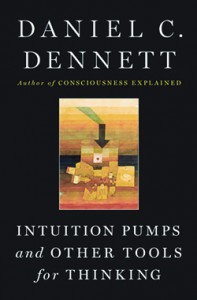Intuition Pumps and Other Tools for Thinking

I sometimes have the impression that philosophers write books mainly for each other. Not so Daniel Dennett, whose latest book is aimed at ordinary civilians like us, and couched in language we can understand without having to read passages over three or four times. Dennett reassured me early on in Intuition Pumps and Other Tools for Thinking when he stated his preference for teaching philosophy to undergraduates, because when they didn’t understand something, they told him so; graduate students were often too full of themselves and tended to fake it.
The book aims at helping us understand certain issues that philosophers have been wrangling about inconclusively for a very long time, and that the religiously inclined argue can only be explained by some kind of divine intervention. The first issue Dennett tackles is the nature of life, then comes the hoary conundrum of free will versus determinism and, finally, the really tough one of human consciousness—the “what am I?” question.
The first issue is easy for those of us steeped in Charles Darwin’s seminal thoughts about evolution. Dennett covers much of the same ground Dawkins and others have already plowed, explaining the process by which simple things can grow more complex over time, and given enough time can become very different from their early progenitors.
The second, free will versus determinism, is tougher. Dennett, if I have understood him correctly, ends up arguing that the question itself is flawed, and anyway it doesn’t much matter. I can buy that.
The third, “what is consciousness?” is the toughest of all. Dennett has no final answer but suggests that modern research by neuroscientists and others is peeling away some of the unknowns. Some of his insights are fresh and fascinating, and leave one with the impression that even this redoubt of the true believers will soon be understandable in modern terms.
The “intuition pumps” of the book’s title are anecdotal snippets, loosely patterned on Aesop’s Fables, that lead in to whatever point is being made. Many are built around fictional people with made-up problems, but chess problems, computer games, and card tricks are all grist for Dennett’s mill. “Other tools for thinking” include unfamiliar words and unfamiliar uses of familiar ones, plus occasional inventions like “jootsing” (Jumping Outside Of the System, a close relative of the more familiar concept of thinking outside the box).
These literary devices vary in their effectiveness. I was already familiar with the ideas behind many of them, but others made me think a bit harder before I digested them. Dennett uses these ideas to build the scaffolding with which he gets us close to the big issues. It’s a different approach from the usual philosophical treatise and, on the whole, a welcome one. The main problem I had was not with the approach itself but with the fact that Dennett doesn’t stick to it consistently. When he sets forth an idea he has published previously he sometimes gets off the track and argues with his critics, who are evidently quite numerous in his profession. Sometimes he relegates this kind of in-house argument to footnotes but not often enough, and his prose can get a bit dense.
But this is only a minor complaint. I can recommend Intuition Pumps for any fellow humanist or atheist who isn’t a philosopher (and doesn’t particularly aspire to become one) but who wouldn’t mind acquiring a few new concepts to help in future arguments with the philosophically inclined, as well as with the true believers.![]()
